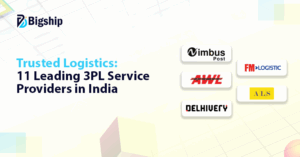In today’s hectic world, people expect things to be easy and hassle-free. So, whether you are running an e-commerce brand or a B2B business, timing matters the most. That’s where appointment-based delivery comes in to make your life easier.

Traditional methods of deliveries that have no fixed timing can arrive at any time, whether you are available or not. Appointment-based delivery lets customers choose their preferred time and date for their shipments. It helps to make sure the shipments are delivered at a suitable time, which you choose and not when the courier wants to, which reduces missed deliveries.
In this blog, we’ll explore more about how adding appointment scheduling in logistics helps businesses to work with ease and make customers happy.
Why Appointment-Based Delivery is Important for Sellers?
Appointment-based delivery plays a very important role in B2B Deliveries and Logistics by ensuring timely deliveries. Let’s take a look at some more benefits of appointment-based delivery offers to sellers.
Efficient Coordination:
With appointment-based delivery, it’s easy to plan and coordinate transportation schedules, it helps to manage resources better, and optimise overall logistics operations.
Scheduled Shipments:
Appointment-based delivery allows sellers to deliver shipments on the planned date and time, which improves delivery accuracy and reduces the chances of missed deliveries.
Better Customer Experience:
Receiving shipments on time creates a positive impression on your customers. It builds their trust in your service, gives them the satisfaction of timely deliveries, and encourages them to make more purchases in the future.
Streamlined operations:
Scheduling deliveries in advance helps you manage logistics operations more easily and efficiently. It gives you the flexibility to plan smooth shipment movement and ensures better coordination between sellers and buyers.
How To Optimise B2B Delivery for Better Business Relationships?
Here are some ways to optimise B2B deliveries to establish better business relationships.
- Understand the needs of your client
Understand your client’s needs, align your service delivery to meet their needs, and maintain open lines of communication for changes. The better you know the expectations, the better you can provide them with the customisation they deserve in delivery and customer service.
- Route optimisations should be done more frequently
Route optimisations can be done more often with the application of route-optimising tools. It assures that your delivery routes remain efficient at all times. If you keep on optimising routes, you will need shorter delivery times and, in some cases, costs; thus, it is a click-and-deliver service, able to help with delays and all forms of B2B delivery.
- A cloud-based solution to automate tasks
Cloud-based tools for automating daily logistics and shipping assignments, such as package inventory, billing, and scheduling delivery, will allow for the prevention of mistakes, time savings, and more room for your team to focus on beneficial tasks, hence making the business run smoothly and efficiently.
- Real-time visibility with live tracking
Real-time visibility means your customer knows precisely where their order is and its status. It is a means to ensure delivery transparency, diminish customer anxiety, and greatly enhance the customer experience.
- Pay attention to quality control
Quality control is an important aspect of delivering satisfaction to your clients and will go a long way in building trust in your business. So, throughout its delivery phase, your service must impose high standards for quality control.
Choosing the Right Cargo Shipping Company for You
Here are some points you need to consider when selecting a cargo shipping company for your business.
- Cost and range of services offered
Verify what services a shipping company offers and how much they charge. Compare with others. Make sure these services fit your business needs and budget. Do not just go for the low-market price that could affect the service quality and make customers unhappy, and also damage your brand.
- Speed of delivery and time
The two main things to consider before selecting a shipping company are delivery speed and timing. This will apply in even larger measure when the export is international. Make sure to consider timely deliveries, whether it’s international or domestic.
- Shipping destinations
If you are planning to export, choose a cargo shipping company that handles international shipments. It is convenient to have your company rely on only one company instead of managing multiple carriers. Share all your export destinations to ensure they serve these places or not.
- Expertise, experience, and reputation of the shipping company
A shipping company’s reputation says a lot about its service. You can check online reviews and testimonials to see if they are good at delivering on time and handling goods well. Customer reviews help determine a shipping company’s reputation as well as their expertise and experience in offering the services you require.
- Cargo insurance
The importance of cargo insurance lies in safeguarding you from financial loss should the cargo be lost or damaged. Preferably, go for a cargo shipping company providing comprehensive insurance against loss. This goes a long way in justifying your cargo’s safety and in timely deliveries.
- Customer service
If there is a cargo shipping company that could offer the best customer service through live chats, emails, etc., get to contact them. At all times, active customer service is helpful if your time might be of the essence. You can interrogate customer support agents of the cargo shipping company by asking any questions you have or raising your doubts. This would give you an understanding of how fast and efficient they are in their responses.
- Tracking and updates
Before choosing a cargo shipping company, check if they are offering live shipment tracking. Let you and your customers see where the package is, when it will arrive, and if there are delays, they must know. This helps you update customers early and manage expectations, reducing the chances of cancellations.
Managing Domestic Cargo: Problems and Solutions
The following will highlight some of the more common challenges in domestic cargo management and their solutions.
- Increasing customer expectations
The customer expectations for online businesses saw a sudden rise after the pandemic. They demand very fast, safe, and affordable shipping solutions. This has created pressure not only on these e-commerce entities but the shipping companies as well. Freight forwarding companies work on behalf of these businesses, usually with tight budgets and even tighter profit margins. To keep up with their competitors in the industry, they end up with huge losses.
- Container shortage
After the pandemic, getting shipping space has become tougher. Fewer vessels, port congestion, and sudden demand have made containers slower and less available.
To manage this, consider LCL shipping if your cargo doesn’t fill a full container, it’s cost-effective. For urgent deliveries, premium shipping is faster but more expensive.
- Labour shortages
There is a labour shortage in many sectors around the globe. And the logistics sector is also among them. Automating manual processes can alleviate the labour shortage faced by freight forwarding companies. This will help ease some burden on their employees. Another option is to use digital tools that allow workers some flexibility.
- Changing laws and Regulations
Even small changes in laws can affect the logistics industry in big ways. These changes may not be obvious at first, but their impact shows up over time. To stay ahead, keep a close watch on regulatory updates, especially for international shipping. Staying proactive is key to staying competitive.
- The unpredictable nature of shipping prices
Shipping prices often change due to fuel costs, demand, or political issues. To manage this, try booking during off-peak times, negotiate the rates, and maintain long-term communication with your shipping partner to handle future price changes.
- Unexpected delay
Some delays can be expected, which could be because of weather changes or route changes that evoke all kinds of delays. All delays can be controlled by communication with the shipper. Inform them about updates. Thereafter, you may adopt all necessary changes in your operations and strategies accordingly.
Using Appointment-Based Delivery in Cargo Shipping
Here are the benefits of leaving management in appointment-based delivery within cargo shipping.
- The flexibility and efficiency of appointment-based delivery guarantee punctuality at times for the timely deliveries
- You can individually tailor services for appointment-based deliveries.
- Appointment-based delivery guarantees easy coordination and handling of appointments efficiently.
- The appointment-based delivery would be a safe and reliable option for shipping.
- Appointment-setting for delivery is also fast and no-hassle message board.
Some upcoming trends that are going to change cargo delivery
- The logistics industry is aiming to become green soon. That’s why sustainability will be a major theme in 2025 and beyond.
- The adoption of artificial intelligence (AI) in logistics is set to increase for purposes of visibility in supply chain networks, optimisation of delivery routes, and enhancement of inventory management.
- Due to the rise in the volume of containers in the system, fierce competition among carriers is expected to surround them, as a result, freight demand and capacity will change.
Conclusion
In an era where time is money, the ability to deliver on an appointment basis becomes a good concept. It ensures that the customer has power over deliveries, protecting businesses from the hassle of delays and annoyances. It means that delivery personnel will have an easier time and better organization, thus leading to happier customers.
Offering flexible delivery time slots can greatly enhance the quality of service, whether you’re B2B or a small-scale business. And here’s why Bigship plays a key role. It offers smart appointment scheduling tools that help you deliver right, every time. Because being on time is not a courtesy in logistics, it’s a necessity.
So sign up now with Bigship and book your next appointment-based delivery!





